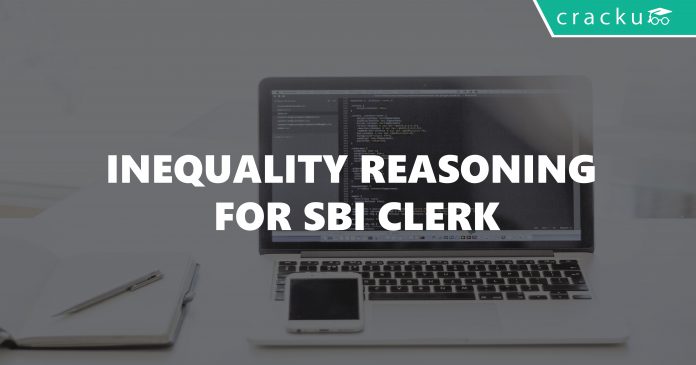Inequality is one of the very important topics in SBI Clerk quantitative aptitude section. Around 5 questions appear from Inequalities in SBI Clerk and PO exams. So, here we have provided some important Inequality questions for bank exams useful for SBI Clerk, PO and IBPS exams.
Inequality Reasoning for SBI Clerk:
Download Inequality reasoning questions PDF for SBI Clerk
75 SBI Clerk Mocks & Sectionals – Rs. 360
Download all SBI Clerk questions and Answers PDF
More Idioms and Phrases questions
For more questions visit SBI Clerk Topic wise practice questions
Instructions:
In these questions, relationships between different elements is shown in the statements. The statements is followed by two conclusions. Study the conclusions based on the given statement and select the appropriate answer.
Question 1:
Statement: K > I ≥ T ≥ E; O < R < K
Conclusions: I. R < E 2. O < T
a) Neither conclusion I nor II follows
b) Both conclusions I and II follows
c) Only conclusion II follows
d) Either conclusion I or II follows
e)Only conclusion I follows
Question 2:
Statement C < L < O = U = D ≥ S > Y
Conclusions I. O > Y II. C<D
a) Neither conclusion I nor II follows
b) Both conclusions I and II follows
c) Only conclusion I follows
d) Either conclusion II follows
e)Only conclusion I or II follows
Question 3:
Statement K ≥ L > M ≥ N
Conclusions I. N ≤ K II. N<K
a) Both conclusions I and II follows
b) Neither conclusion I nor II follows
c) Either conclusion II or II follows
d) Only conclusion I follows
e)Only conclusion II follows
Take a Free SBI Clerk Mock test
SBI Clerk syllabus PDF download
Question 4:
Statement: Z ≥ Y = W ≥ X
Conclusions I. W<Z II. W=Z
a) Only conclusion II follows
b) Only conclusion I follows
c) Neither conclusion I nor II follows
d) Either conclusion I or II follows
e)Both conclusions I and II follows
Question 5:
Statement: B > A > S < I > C > L >Y
Conclusions I. B>L II. A>Y
a) Only conclusion I follows
b) Only conclusion II follows
c) Either conclusion II or II follows
d) Neither conclusion I nor II follows
e)Both conclusions I and II follows
SBI Clerk Previous question Papers
Solutions (1 to 5)
1) Answer (a)
According to the given inequalities, K is largest among all but nothing specific can be said about O,R,I,T and E. Hence, no conclusion can be drawn from the given information. So answer will be A
2) Answer (b)
As it is given in statement 1 that O=U=D which is greater than S, Y, L and C hence, the conclusions O>Y and C<D can drawn from the given statements. Hence, answer will be B
3) Answer (e)
In conclusion 1, it is given that N<=K. That’s not possible as N is less than or equal to M which is absolutely less than K. Conclusion 2 is valid as it mentions that N < K. Hence, only conclusion 2 will follow.
4) Answer (d)
According to the given statement Z>= Y and Y=W So Z>=W
Hence, anyone of the conclusion might be followed. Hence, answer will be D
5) Answer (d)
According to the given inequalities, nothing certain can be said about B, L and A, Y as no absolute measurement can be drawn from the given inequalities. Hence, answer will be D
So, we have gone through and might have understood how to solve Inequality questions in bank clerk exams like SBI clerk and IBPS.





![How To Manage Time In CAT Exam? [Section-wise Tips] How to manage time in CAT exam ?](https://cracku.in/blog/wp-content/uploads/2018/09/fig-03-09-2018_10-54-46-218x150.jpg)
[…] Inequality […]